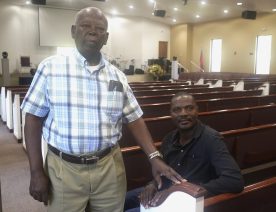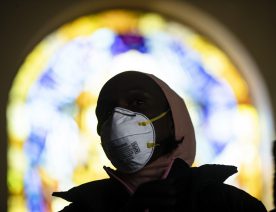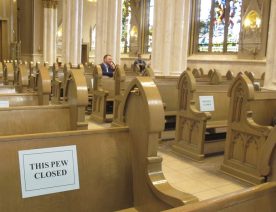
December 19, 2021
As vaccination rates rise across the United States, life in religious congregations is showing signs of slowly returning to normal. Twenty-one percent of adults are attending religious services in-person at least once a week, up from 5% in May 2020. While fewer are watching live streaming services, many continue to pray privately in their homes.
Most Americans believed in God before the outbreak and still do. About a quarter say their faith or spirituality has strengthened because of the outbreak and only a few say it’s been weakened. A majority who believe in God feel that God is telling humanity to change how it is living and that God is protecting them from being infected.
Twenty-three percent say they have heard a religious or spiritual leader talk about COVID-19 vaccines either in a personal conversation or at a service. Of them, 50% say a religious leader encouraged getting vaccinated and only 15% heard a message against inoculation. Forty percent of those who spoke with or heard a religious or spiritual leader discuss vaccines say that message was an important factor in their decision whether to get immunized.

Overall, 25% of Americans are extremely or very worried that they or someone in their household might get infected with COVID -19. White Protestants are less inclined to worry about a COVID-19 infection compared with Catholics and non-white Protestants.
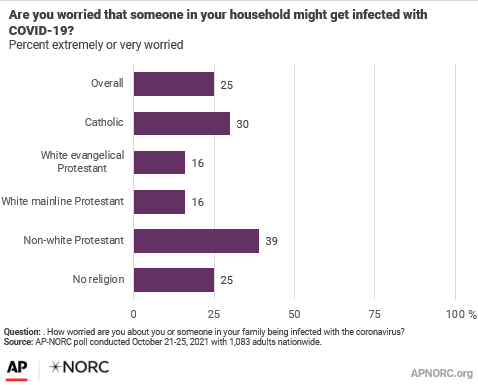
Overall, the pandemic has not changed the attitudes of believers about God. About 8 in 10 say they believe in God today and did so before the pandemic in the current survey. Similar results were found in an UChicago Divinity School/AP-NORC Poll taken in 2020.
Those who believe in God have not changed their views about God in relation to the pandemic. Among them, few think God has abandoned humanity or have doubt that God exists. A majority do think the COVID-19 pandemic is a sign that God is telling humanity to change how people live, including 36% who feel so strongly and 30% who feel so somewhat. And 53% think God will protect them from the virus.
Fifty-eight percent of white evangelical Protestants along with 77% of non-white Protestants think God will protect them from coronavirus infection. Among Catholics, 49% say God will protect them from getting sick with COVID-19 along with 37% of white mainline Protestants and 42% of people who do not identify with any particular religion.
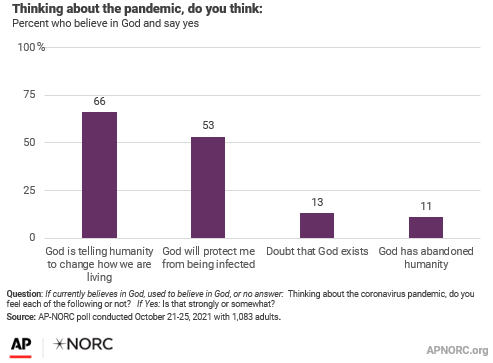
In the spring of 2020, many churches, synagogues, and mosques were shuttered. But there are signs that life in many religious congregations have started to return to normal. Twenty-one percent say they are attending religious services in-person at least once a week, up from 5% in May 2020. And fewer (14%) are watching the live streamed services compared to 2020 (27%).
Nearly half of Americans continue to pray privately at home at least weekly. Twenty-seven percent read scriptures outside a congregation, and 24% meditate. White evangelical Protestants are more likely than members of other religions to pray privately (85%), read the Bible (62%), and go to church in-person (41%).
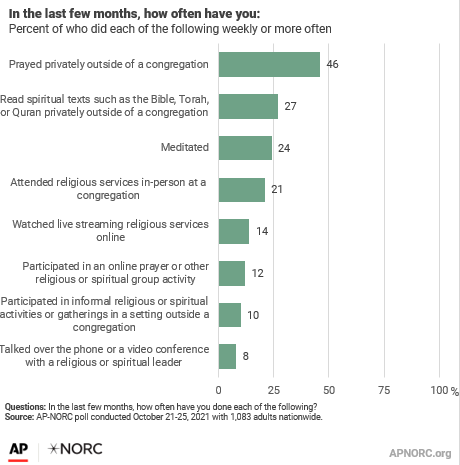
For most Americans, the pandemic has not impacted their sense of religious faith or spirituality. Twenty-four percent of all Americans say their faith or spirituality has grown stronger because of the COVID-19 pandemic. Most say it remained the same.
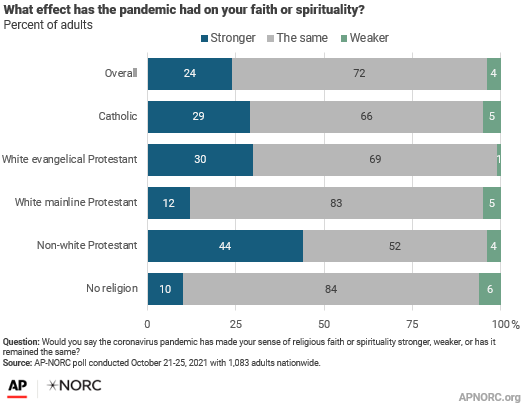
The nationwide poll was conducted October 21-25, 2021 using the AmeriSpeak® Panel, the probability-based panel of NORC at the University of Chicago. Online and telephone interviews using landlines and cell phones were conducted with 1,083 adults. The margin of sampling error is +/- 4.0 percentage points.
- Suggested Citation: AP-NORC Center for Public Affairs Research. (October 2021). “Religion and the Pandemic.” https://apnorc.org/projects/religion-and-the-pandemic/





